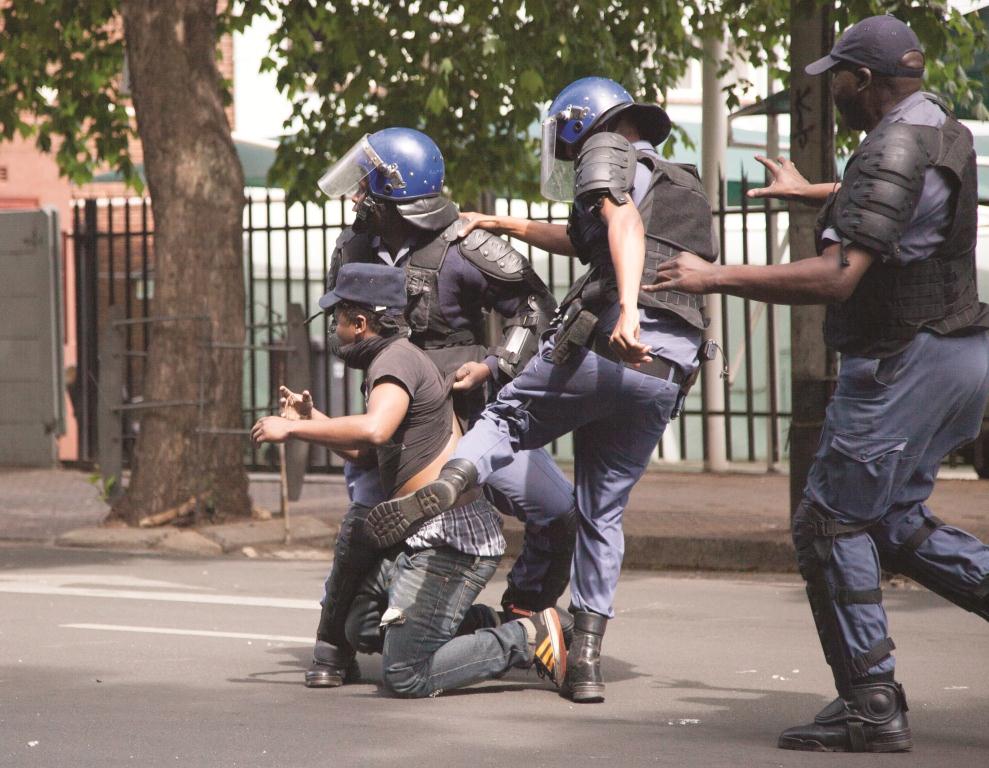A year ago, students were hailed as heroes when they fought for free education. With spirit, focus and a determination to pull together in a common cause, they won an important battle on the slopes of the Union Buildings to freeze university fee increases for 2016.
Fast forward 365 days and that victory is a fleeting memory overshadowed by 831 arrests that represent a temporary truce that has been broken. This year, students radicalized. Violence escalated on campuses and out onto the streets. In Braamfontein, Johannesburg, students from the University of the Witwatersrand (Wits) switched from revolutionaries to petty criminals. In the name of free education, buses were set alight and shops were looted.
In Cape Town, Finance Minister Pravin Gordhan’s budget speech was delivered to the thud of stun grenades outside Parliament. Students also began throwing petrol bombs and smashing police vehicles and library windows.

It followed a police crackdown where students were placed under curfew, had their dorms raided and leaders arrested. It led to 831 arrests and 411 criminal cases, says South Africa’s Acting National Police Commissioner, Lieutenant-General Charles Phahlane.
Loading...
“There are those who have bombarded us with calls to withdraw police officials from university campuses. We reiterate that it is the violence and criminal acts being committed on those campuses that have invited the presence of the SAPS,” says Phahlane
Former Wits SRC leader, Shaeera Kalla, was hit nine times in the back with rubber bullets while she stood with her hands raised while protesting on campus. Police maintain the crowd had, prior to this, interrupted a test and torn up papers.
Former Wits student leader, Mcebo Dlamini, was detained and held in prison for three weeks before successfully appealing and being released on R2,000 bail.
In light of the extreme nature of this year’s protests, public sympathy has waned. Phahlane maintains the police have reacted with minimal force even when “attacked and pelted with stones”.
Still, the cries of the students involved in the #FeesMustFall movement remain unchanged – free education for all.
“Conversations that were once relegated strictly to the humanities are spilling over into other departments, faculties and disciplines in ways that will hopefully consolidate them in the future, as repositioning and reconstructive efforts begin to take root,” says Brian Kamanzi, a writer and electrical engineering master’s student at the University of Cape Town.
“Currently, a Bachelor of Science program at the University of Cape Town could cost as much as R50,000 ($3,700), a steep price for education in a country where the average annual income is R88,000 ($6,600).”
“Over the years, enrolment in the country’s 26 higher education institutions has steadily grown and in 2017 it is expected to reach 1,053,420. While the intake of students considerably increased, the government’s contribution to universities’ income decreased by 18.4 percent, with the total state budget for public higher education accounting for only 0.74 percent of the gross domestic product.”
Kamanzi argues an overwhelming number of students need loans for education and are forced into debt cycles.
Concerns have also been raised that the students lack unity.
“This has been particularly disconcerting, as the discourse on inclusion of black radical feminism and representation of women and queer activists in leadership structures and media encounters has visibly given way to popular male figures and increasingly centralized leadership,” he says.
Kamanzi also defends the violent acts of students, saying that they were in retaliation.
“What followed was mass arrests, internal expulsions and court interdicts, including denial of bail in some cases; more than 830 protesters have been arrested since February. At the same time the media has not properly reported on the violence against student protesters, which has escalated to incidences of sexual assault by private security and the police.”
Amid all this, universities struggled to keep their doors open and complete the academic year. The country is also facing a $400-million graduate brain drain.
“Progress in negotiations across the campuses is difficult as many protesters are in jail, suspended or expelled. The success of the movement shall be determined, I believe, by its ability to move beyond the campuses and involve broader society,” says Kamanzi.
The question now is not how these protests will end, but if they will end.
Loading...
